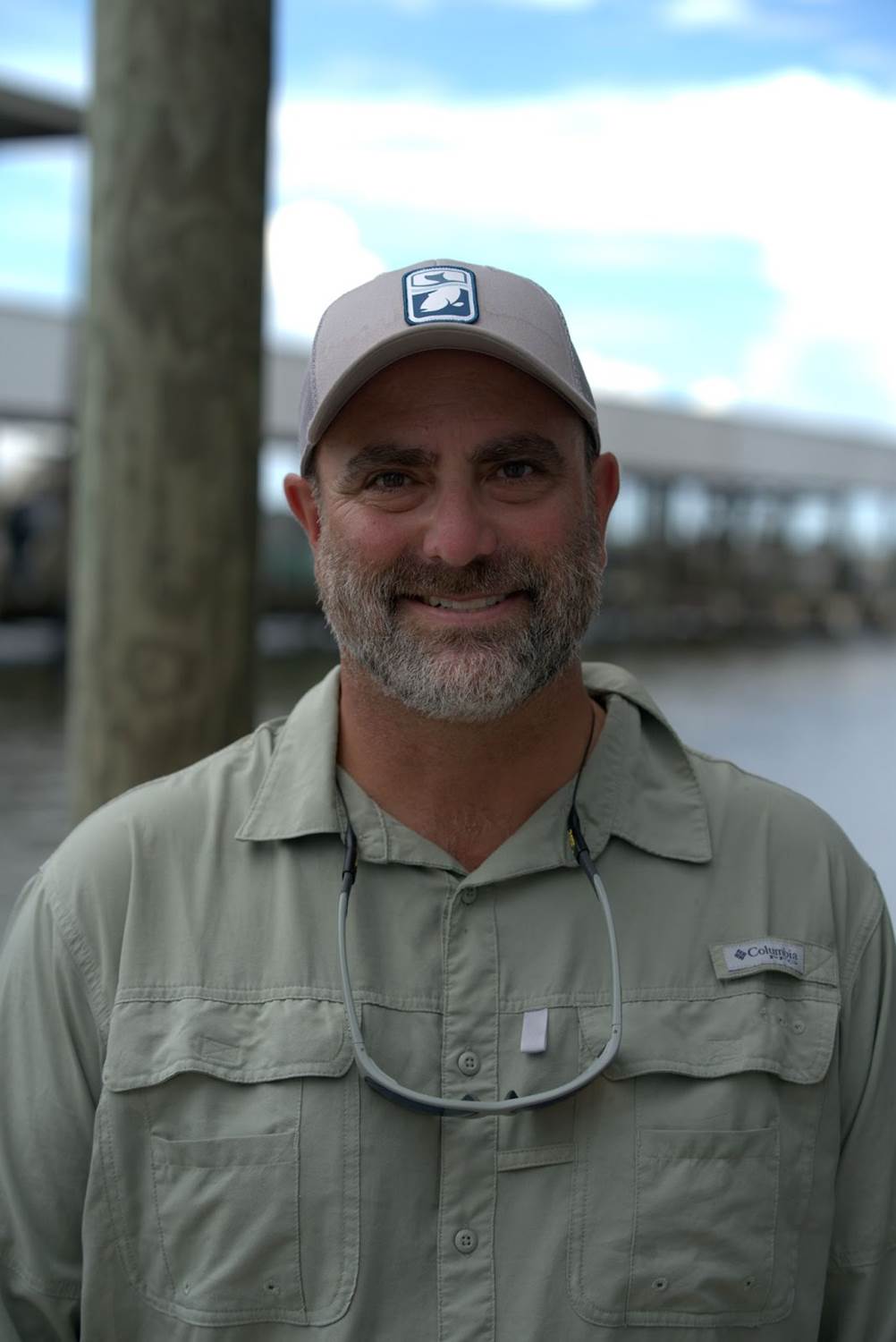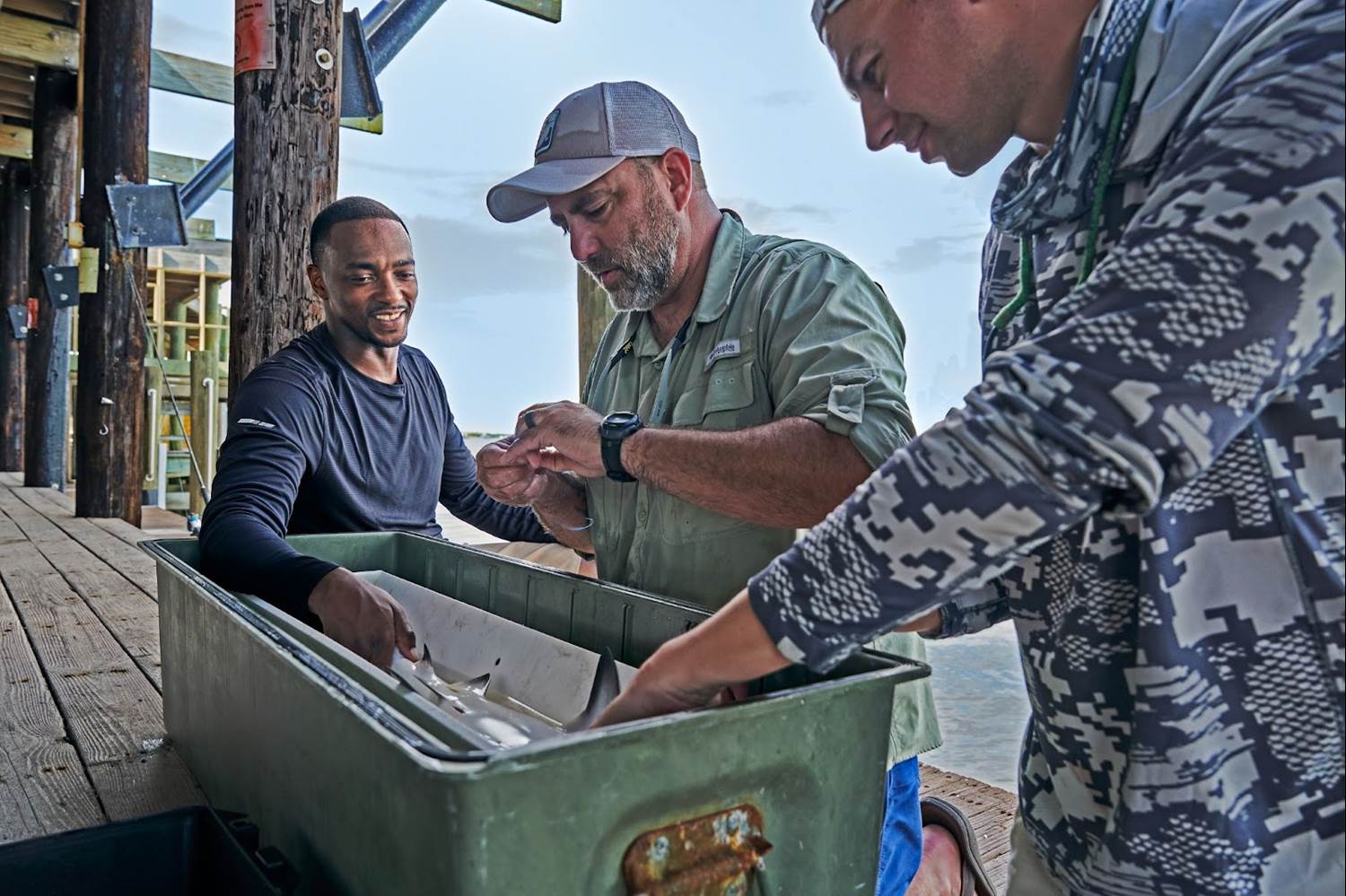Interview: Shark Scientist Marcus Drymon on the New Shark Fest Special “Shark Beach with Anthony Mackie” and More
If one were to make a list of the coolest job titles in the world, “Shark Scientist" would probably place pretty high. Luckily for Marcus Drymon, that’s exactly the title he gets to claim (alongside being an Associate Extension Professor at Mississippi State University). Specifically, Dryon is a marine fisheries ecologist, with research interests in applied fisheries ecology and a focus on coastal sharks. He also happens to be featured in the new Nat Geo Shark Week special Shark Beach with Anthony Mackie.
Recently, we had a chance to chat with Drymon about his work, what people get wrong about sharks, and more.
Laughing Place: Hi, Marcus. How are you?
Marcus Drymon: I'm great, thanks. Nice to meet you.
LP: Nice to meet you too — happy Shark Fest.
MD: Same to you. Same to you. I love it.
LP: So, to start, what got you into sharks?
MD: Oh goodness. The same thing that gets every young boy or girl into sharks. It's like dinosaurs or space. It is just one of those things that's inherently fascinating to a young child. And the same was true with me. I literally grew up fascinated with sharks and read every sort of coffee table book I could. And just over time that led to studying the sciences and things like that in high school and ultimately college. And after that, where I had the chance to continue to study these sharks that have fascinated me since childhood.
LP: One of the things that Shark Beach with Anthony Mackie makes us realize is that, unlike dinosaurs in space, they're in our backyard — or can be. Do you think people sometimes have a misconception of how close to our world sharks can be?
MD: A hundred percent. So a lot of the work I do is survey work. So in other words, going out on the water, setting the same type of fishing gear over and over and over every month over the course of years, and then tracking how those changes in the catch represent changes in the actual shark population. So we use a lot of hook and line gear to do that, just to sample the shark population. And oftentimes our sampling, our work takes us right up to the beach or right to these near shore areas. And people are typically shocked when we catch, oftentimes pretty big sharks right near areas where people live and swim and habitat. But I think that's one of the interesting aspects of them is, despite being such mysterious and fascinating creatures, they are accessible in the areas that we live in.
LP: And by doing your tracking work, you bring a shark in, you do a little shark surgery, you put them on their back, which apparently calms them down. As someone who grew up interested in sharks, does the fact that you're doing this as your job ever kind of hit you?
MD: Honestly, and I'm being very frank, it hits me every single day, every time I'm on the water, in particular when I'm with students, whether it's my graduate students or just the day before yesterday, I had a class of 36 high school students I was on the water with. And just to see their fascination with what may be their very first encounter with a shark reminds me that I have the best job on the planet and that I'm incredibly lucky to be able to still look at and marvel at these animals 40 years after they first caught my attention.
LP: After 40 years, are you still learning things about them that catch you by surprise?
MD: Oh goodness, all the time. It's interesting. When I was a kid, you'd read a coffee table book about sharks and it would say there are 346 species of shark on the planet. And in the 20 or 30 years since those books have been written, we now know that's not even close to the truth. We know there's well over 500 species of shark, and we're constantly discovering new species. I mean, every year that number gets bigger and bigger and bigger. And so it is just a humbling reminder that we have an incredible amount to learn. Still, we've learned a lot about these fish, but we have a long way to go before we truly understand all the aspects of their biology and ecology.
LP: Shark Fest shows the public's passion for being engaged by these creatures. But what do you think is a common misconception the general public have about sharks?
MD: Well, those misconceptions have shifted. 30 years ago, the common misconception was that sharks were out to get people, so to speak, that if folks are at the beach and swimming in the water, they should be afraid of sharks. That sharks might be hunting them as an active part of their prey field, which is, of course, we know that's not true now. But what I'd say the common misconception now is that shark populations have exploded in the past five to 10 years, and that now creates this human wildlife conflict called depredation, which we tackle in this documentary. So it's interesting to see the perceptions shift from “sharks threaten our safety" 30 years ago to “sharks threaten our recreational and commercial fishing opportunities" now.
LP: Obviously you have a big platform having a star like Anthony Mackeie will draw eyeballs to it. And you're on Nat Geo, Disney+, and Hulu. What do you hope people take away from the documentary?
MD: What a great question. I mean, several things, but the first thing that comes to mind is that, yes, this is a conflict. These sharks interacting with fishermen and the fish that these fishermen are trying to land. So as someone who's spent their life studying sharks, I don't want to diminish that negative feeling and those emotions that fishermen have when they're unable to get the fish that they work so hard to catch when it gets bitten before it gets to the boat. I don't want to diminish that, but I do want to emphasize that sharks eating fish, whether or not that fish is attached to a fishing line, that's a natural interaction. It is. And we changed the ecosystem in the past 20, 30, 40, 50 years. So we should expect these interactions like depredation to be different today than they were 20 years ago.
I hope people watching this understand that, you know what, this can be a frustrating interaction when sharks do that, but they're also getting to witness wild predators in their natural environment, which is really pretty fascinating.
LP: You got to work with Anthony Mackeie, who is from that area. What was it like to work with him and teach what you know? Was he enthusiastic about getting more understanding of his own backyard?
MD: Oh, it was a treat. I mean, he's a guy's guy. We immediately bonded over fishing. We're both guys that like to fish. He grew up in that area. I transplanted to this area, but regardless, we both spent a lot of time fishing there, so we just had a lot of talks about things like that.
We also bonded over traveling. He's a traveler as am I, and we're both avid scuba divers. So it's fun to share information about things like sharks with someone like that who's had the opportunity to go to different places and see these animals in different environments and who, as a fisherman, fundamentally understands how cool these animals are. And on the other hand, how frustrating it is when they're interfering with your fishing activities.
LP: To wrap up, do you have a favorite kind of shark?
MD: Oh gosh, absolutely. Nine times out of 10, it's a blue shark for many reasons. They have this beautiful shape, this beautiful coloration. They're also world travelers. They make long distance migrations. They're relatively common. In other words, they're found in most oceans on the planet, which kind of to me makes them the every man's kind of shark. And they have these long fins, these long pectoral fins. So they're really graceful looking in my opinion. But tiger sharks are a close second for a billion different reasons, and I could go on and on and on. But those two definitely stand out to me.
LP: Well, congratulations and thank you for the documentary. Thank you for the work you do to help us better understand it. And thanks for taking the time out to talk to me.
MD: Oh, my pleasure. Thanks for your interest and what a treat this has been.
Shark Beach with Anthony Mackie is now streaming on Disney+.




